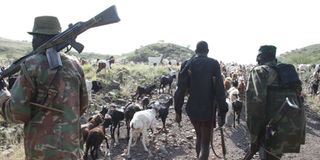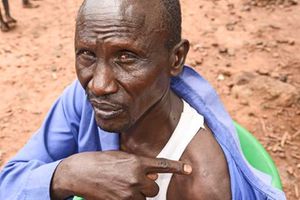
In this file picture, armed herdsmen from Turkana community escort their animals on the Lomelo-Lokori road in Turkana County.
Armed juvenile bandits have been terrorising North Rift residents and giving security agencies sleepless nights, baffling even the government itself.
The national government is coming to terms with the reality of young boys aged between 13 and 17 years who have been recruited into banditry and trained to handle sophisticated weapons on the battlefields, engaging security officers in banditry-prone villages in the region.
The irony is that the teenagers wreaking havoc in the region are illiterate minors who have either never stepped inside a classroom or dropped out for the battlefields where they have been trained to handle different kinds of rifles.
A fortnight ago, at a security meeting in Baringo County, Interior Cabinet Secretary Kipchumba Murkomen raised concern about the tragic irony of children who should be in school, yet are active on the battlefields, engaging multi-agency teams carrying out security operations in the region.
The meeting at Kampi Samaki, Baringo North, was attended by security chiefs and administrators from the banditry-prone areas in the County.
“How come the multi-agency team comprising of the military, General Service Unit (GSU), Anti-Stock Theft Unit (ASTU), Rapid Deployment Unit (RDU) and police reservists are fighting in the battle field with young boys aged between 13 and 17 years old,” the CS had posed at the meeting.
He put chiefs in affected areas on the spot, questioning why the children were not in school. He said the minors were both perpetrators of crimes and also victims because they had grown up knowing nothing about education, but operating a gun.
“We have learnt that there are more children out of school in Tiaty constituency than in school. Those children cannot even read a single word, but know how to use different kinds of rifles. Chiefs from that region should be ashamed that these minors cannot even speak the Swahili language you are speaking,” he stated.
Nation.Africa has since established that many cattle raiders were groomed for banditry at a very tender age, and many have either never attended school, or others dropped out.
On a tour of banditry-prone areas, we witnessed young boys as young as eight years carrying sophisticated guns on their backs with confidence.
Possessing a firearm in the banditry-prone communities is a treasure, we learnt, it is like a walking stick in the Wild West.
A security officer who has served in the war-torn region for years narrated how daring the young bandits are.
He revealed that they have been ambushed several times by bandits as young as 12 years old, who seem to be well-trained and conversant with operating sophisticated firearms.
“Those responsible for these senseless killings are very young boys who seem to be well trained on how to shoot and kill, and are well conversant with the rough terrain of the area,” said the officer who spoke on condition of anonymity because of the sensitivity of the matter.
“These young bandits are very tactical and very well trained in handling sophisticated firearms. Though they are young, they can fight with security officers the whole day without getting tired or running out of ammunition,” he said.
A Nation.Africa investigation established that young, illiterate herding boys are trained at an early age to handle guns.
Boys as young as eight years are separated from their mothers and taken to herding camps where they are subjected to hardships and trained to survive such difficult climatic conditions and rough terrains.
The boys must learn survival skills to be sharp and hardy, we learnt.
One such case is of a young man we shall call Kamama Kalegeno (not his real name), Kaghat village in Tiaty constituency. He is aged 20.
He was enrolled in pre-primary in 2014 at the age of nine, but dropped out two years later when he was barely 12 years old because he could not endure the long walking distance every day to Chesotim Primary school, more than 13km away.
His parents had reluctantly allowed him to go to school following several warnings from the area chief, who threatened their arrest if they did not comply with taking their five children to school.
They had released Kamama for schooling, while his four siblings continued herding their father’s hundreds of livestock, a common task for young boys in remote Tiaty villages.
With the scarcity of schools in the region, he had to trek 13km daily to a makeshift ECDE centre, sometimes on an empty stomach as there was no school feeding program, and many times lacking the basic learning necessities such as books and pencils.
There were occasions of missed learning, as there was one teacher at his school who took the two classes in shifts, and sometimes failed to report, making it a wasted day for learners.
At 11, Kamama was required to proceed to Grade One, but the school was only accommodating pre-primary learners. This meant he either transferred to the neighboring primary schools, more than 20km away, to continue with his learning.
That is how he resumed herding with his peers, fed up with the challenges associated with learning.
“Schooling for me was torture because I had to trek through thick bushes under the scorching sun and the rough terrain. I also needed to enroll in another school in grade one, which was a further distance due to the scarcity of schools. I resorted to going back to herding,” he said.
At 20 years now, he has honed the skills of using sophisticated firearms, which he said is a requirement to protect livestock from being stolen.
Like Kamama, hundreds of thousands of children in remote villages in Tiaty give up schooling and turn to herding at a tender age, and are later recruited into banditry.
Often, these child herders invade neighbouring communities in the guise of looking for pasture and water, but end up engaging in banditry.
A resident of banditry-prone Chemoe in Baringo North, Richard Chepchomei, claims prominent individuals from the region use minors to wreak havoc and scare away residents in a bid to expand their territories.
“These are young school-going children funded by some people to execute such crimes. Where do you think a twelve-year-old boy gets money to buy guns and ammunition? He posed.
According to the elder, close to seven children suspected to be from the neighbouring community have been killed in areas such as Ng’aratuko, Yatia, Loruk, and Chemoe, after being intercepted by police while trying to raid other communities.
“Adult raiders are more tactical, but juveniles shoot anyhow because most of them want to satisfy their curiosity, thus leading to such senseless killings. It is also hard to trace them because they take to their heels after that,” he said.
An elder from Nginyang in Tiaty Central, Yuda Losutan, said scarcity of schools and teachers and the high illiteracy levels among parents have pushed thousands of children out of school, with girls being married off, while the young boys turn to herding and banditry.
“With no basic education and religion, what do you think young boys engage in while in the bushes herding?” Mr Losutan posed.
“A 10-year-old boy who has never stepped into a school is very skilled in using sophisticated firearms because that is what they do in the bushes during their free time. Gradually, they are recruited into banditry,” he said, rooting for forcible schooling.
Julius Akeno, a Tiaty resident and author of the book ‘Patrons of the Wild Suguta Valley’, says young boys under 10 years are assigned herding roles, and this is where bandits get their skills from.
He notes that underage boys are trained and hardened to walk long distances under harsh weather with no food, only depending on animal products and wild fruits. Young herders move livestock far away and can stay there for some years without coming home, during which time they are transformed into bandits, he noted.
At a tender age, boys were separated from their mothers and were not allowed to sleep in their mothers’ huts. Their place is aperitif, an open fireplace in the compound.
They were trained to be alert always, even when asleep. They were told to sleep with their eyes closed, but their ears were open. No one should walk in unheard and find them asleep. It would be a mistake punishable by several lashes of the cane. The rough handling of young boys will make them hardy to prepare them for a tough life ahead,” reads part of his book.
According to Akeno, guns entered the area in the early 1970s and have become a common weapon not only for personal and community protection, but also as a herding tool.
Given the long time the gun has been with the people, boys grew up with it, played with it, practiced with it, and with time they became experts in using it after learning from their seniors and peers through observation and practice, he notes.







